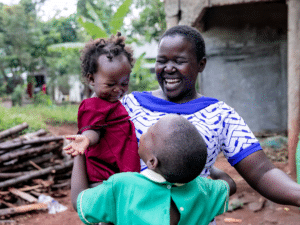Ten Years of Investing in Mental Health at StrongMinds is Accelerating Global SDG Progress
 Kampala, Uganda, February 21, 2023 – Mental healthcare is critical to achieving the United Nations Sustainable Development Goals (SDGs). 2023 marks the halfway point for reaching the SDGs, which aim to end poverty and protect the planet by 2030. However, by current estimates, twenty-six countries in sub-Saharan Africa are not on track to meet any of the 17 SDGs by the 2030 deadline. StrongMinds, a global mental health NGO, is rapidly scaling mental health access across Africa to accelerate progress toward these goals.
Kampala, Uganda, February 21, 2023 – Mental healthcare is critical to achieving the United Nations Sustainable Development Goals (SDGs). 2023 marks the halfway point for reaching the SDGs, which aim to end poverty and protect the planet by 2030. However, by current estimates, twenty-six countries in sub-Saharan Africa are not on track to meet any of the 17 SDGs by the 2030 deadline. StrongMinds, a global mental health NGO, is rapidly scaling mental health access across Africa to accelerate progress toward these goals.
“Mental health cuts across every single Sustainable Development Goal,” said Tina Ntulo, StrongMinds Uganda Country Director. “Conflict, extreme poverty, disease, and natural resource scarcity exacerbate many mental health conditions. At the same time, proper mental healthcare can foster resilience and restore hope, helping people overcome extreme challenges to build a better life for themselves and their families.”
Task-shifting and peer-based support are key to closing the mental health treatment gap. Through this method, local community members are trained as non-specialists to provide community-centered mental health support. The World Health Organization has endorsed this approach, which increases the number of available individuals qualified as mental health leads, which is particularly vital in low-resourced communities. For the past decade, StrongMinds has pioneered a community-based depression treatment model in Uganda and Zambia.
Many of the most urgent SDGs are well-positioned for stronger outcomes by improving women’s mental health. This is especially vital as populations in the most vulnerable countries are projected to continue to grow, with the African continent seeing the largest relative population growth of 42% by 2030. Beyond SDG 3, which aims for universal good health and well-being, we see links to the necessity of good mental health in all 17 Goals. For example, women that complete StrongMinds therapy have a 13% increase in family food security (SDG 2: Zero Hunger), a 30% increase in children’s school attendance (SDG 4: Quality Education), and a 16% increase in economic productivity (SDG 8: Decent Work and Economic Growth.)
Mental health plays a significant role in achieving stability within low-income communities. People with good mental health experience better economic, educational, and health outcomes. By expanding access to community-based mental healthcare, the global community will be better prepared to address other pressing problems related to health, education, poverty reduction, and climate.
For additional information about links between mental health and the United Nations Sustainable Development Goals, please visit: https://strongminds.org/sdgs/.
Media Contact:
Roger Nokes
Media & Engagement Manager
roger@strongminds.org
